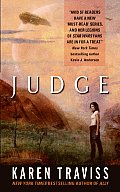
| Series: | Wess'Har #6 |
| Publisher: | Eos |
| Copyright: | April 2008 |
| ISBN: | 0-06-088240-9 |
| Format: | Mass market |
| Pages: | 391 |
This is the sixth and final book of the Wess'Har series. As with the rest of the series, it should not be read out of order, and it's difficult to review without spoilers for previous books. This review will therefore necessarily be somewhat non-specific.
I've been a bit worried about this conclusion since the series, after a very energetic start, lost some momentum and drifted through the middle books. But Ally built the momentum back up, and Traviss makes some good decisions here to keep up the narrative pace. Some long intervals are skipped over and then filled in later, in a sort of time-lapse look into the plot that was quite effective. Traviss also throws in some great plot twists, following the twists at the end of Ally, and kept me guessing through much of the book.
Judge does suffer significantly from one problem that most of the books in this series have suffered from, namely awkward and repetitive reintroduction of key concepts from previous books in an attempt to refresh the reader's memory. It's extremely difficult to do this well, and Traviss doesn't. For someone who reads the series close together, the background infodumping is annoying and breaks the flow of the story. Even for someone who's been away from the series for a while, I suspect Traviss's method of reminding the reader of key bits of the story will feel forced. I wish more authors would simply write a plot summary of the previous volumes, stick it into the book as a prefix, and then write the novel assuming the reader remembers the previous volumes. Sadly, this is a rare tactic, even though it can work brilliantly.
That problem aside (remnants linger past the 100 page mark), this is one of the best books of the series. Traviss brings the primary plot to a satisfying conclusion, but sidesteps the problems with resolving a story with such huge impact by using that time-lapse method and by focusing on small pieces of it. The extended mechanics of plot resolution are gracefully sidestepped by a tight focus on the characters, and the conclusion of the book is an emotional and moving climax to the character development arc rather than the effects of the story on the setting. If one had asked me in advance whether that was the right approach for this series, I would have been skeptical, but it works. Any conclusion that at points brings me to tears is doing something right.
That character-driven climax was true to all of the characters, although minorly disappointing in some specifics. Unfortunately, but not unexpectedly, Giyadas didn't get much of a part, and I missed her. But Traviss otherwise took the time to thoroughly explore the outcome of the story for the characters and to give them time for an emotional denouement, which turned out to be as satisfying or more so than the primary science fiction plot arc. I even developed a bit of sympathy for the characters I hated, although one of them was oddly inconsistent over the course of the story and never quite rang true for me.
The ethical dilemmas that have haunted the series from the beginning are addressed more directly and with more resolution here, which cuts down on the recurring angst. That was a welcome change. I think the series reaches some firm, if controversial, conclusions about the competing wess'har and human ideals of ethics and on the internal struggle between responsibility and self-protection. Traviss concludes the series with some surprising but fitting touches of kindness towards characters who have lived through a great deal of damage.
Judge is an effective and complete payoff for the readers who have stuck all the way through the series and confirmation that this series is well worth reading. If you've started and you like what you're reading so far, finish. Traviss doesn't play the story false.
Reviewed: 2009-11-08